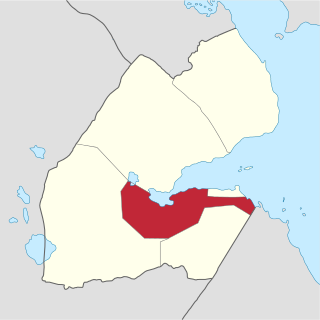| |||||||||||||||||||||||||
| |||||||||||||||||||||||||
All 65 seats to the National Assembly | |||||||||||||||||||||||||
|---|---|---|---|---|---|---|---|---|---|---|---|---|---|---|---|---|---|---|---|---|---|---|---|---|---|
| |||||||||||||||||||||||||
| |||||||||||||||||||||||||
 |
|---|
| This article is part of a series on the politics and government of Djibouti |
| Constitution |
Legislature
|
A parliamentary election was held in Djibouti on 8 February 2008. [1] There were 65 candidates running for the 65 seats in the National Assembly, with all of the candidates coming from the ruling coalition, the Union for the Presidential Majority (UMP). [2] The opposition boycotted the election, and the UMP won all 65 seats. [3]

Djibouti is a country located in the Horn of Africa. It is bordered by Eritrea in the north, Ethiopia in the west and south, and Somalia in the southeast. The remainder of the border is formed by the Red Sea and the Gulf of Aden at the east. Djibouti occupies a total area of 23,200 km2 (8,958 sq mi).
In boycotting the election, the opposition complained that the electoral system guaranteed victory for the UMP; [1] [2] in the previous January 2003 parliamentary election, the UMP won all 65 seats even though the opposition won 38% of the vote. [1] The opposition unsuccessfully demanded that proportional representation be introduced. Ismael Guedi Hared, a leader of the opposition Union for a Democratic Alternative, said that the country effectively had a one-party system, that "none of the democratic rules [were] respected", and that the government was unwilling to accept proportional representation because it was fearful of discontent. [2]
Proportional representation (PR) characterizes electoral systems in which divisions in an electorate are reflected proportionately in the elected body. If n% of the electorate support a particular political party, then roughly n% of seats will be won by that party. The essence of such systems is that all votes contribute to the result - not just a plurality, or a bare majority. The most prevalent forms of proportional representation all require the use of multiple-member voting districts, as it is not possible to fill a single seat in a proportional manner. In fact, the implementations of PR that achieve the highest levels of proportionality tend to include districts with large numbers of seats.
In a decree on 26 December 2007, President Ismail Omar Guelleh set the election date for 8 February 2008. [4] Subsequently, in a presidential decree on 6 January 2008, campaigning was scheduled to begin at midnight on 25 January and run until midnight on 6 February. [5]
The UMP filed its list of candidates at the Interior Ministry on 10 January 2003. More than a third of its candidates were new, [6] and nine of its candidates (14% of the total) were women. [6] [7] In addition to the main governing party, the People's Rally for Progress (RPP), the UMP coalition included the National Democratic Party (PND), the moderate faction of the Front for the Restoration of Unity and Democracy (FRUD), the People's Social Democratic Party (PSD), and the Union of Reform Partisans (UPR). [6] Prime Minister Dileita Mohamed Dileita headed the UMP list. [1] [2] According to Dileita, the government's refusal to introduce proportional representation was due to the need to preserve "the tribal balance", pointing to chaotic conditions of neighboring Somalia as an example to avoid. He did, however, say that it might be necessary to consider introducing proportional representation at some future time. [2]
The People's Rally for Progress is a political party in Djibouti. It has dominated politics in the country since 1979, initially under the rule of President Hassan Gouled Aptidon. Today it is led by President Ismail Omar Guelleh and is in a coalition government with Front for the Restoration of Unity and Democracy (FRUD) and other parties.
The National Democratic Party is a political party in Djibouti. It was founded as an opposition party in 1992 by Aden Robleh Awaleh, who remains the party's president. It was part of the ruling coalition in 2005, but has since rejoined the opposition against President Ismaïl Omar Guelleh.

The Front for the Restoration of Unity and Democracy is a political party in Djibouti. It is aligned with the interests of the Afar people who live in that country, although it has supporters residing outside of Djibouti.
The newly formed Arta Region was represented as a separate constituency for the first time in the 2008 election. Three seats were at stake there. [6]

Arta Region is one of the six regions of Djibouti. It is situated in the south-central of the country, bordering the Tadjoura Region to the north, and the Djibouti Region to the north-east, and Dikhil Region the Ali Sabieh Region to the south, the county of Somalia lies to the east.
Yacin Elmi Bouh, the Minister of the Interior, announced on 9 February that the UMP had won all 65 seats and placed turnout at 72.61%, which he said was the highest in 15 years. Out of 151,490 registered voters, 109,999 were said to have voted, with 103,463 votes in favor of the UMP and 6,536 null votes. Voter registration was low, however. [3]
The African Union and the Arab League observed the election and gave it a positive assessment. The Constitutional Council validated the results on 17 February, and the National Assembly met for the first session of its new term on 20 February, re-electing Idriss Arnaoud Ali as President of the National Assembly. [7]
| Parties and coalitions | Votes | % | Seats | |
|---|---|---|---|---|
Union for the Presidential Majority (Union pour la Majorité Présidentielle)
| 103,463 | 94.06 | 65 | |
| Invalid/blank votes | 6,536 | 5.94 | — | |
| Total (turnout 72.61%) | 109,999 | 65 | ||
| Source: AFP | ||||





